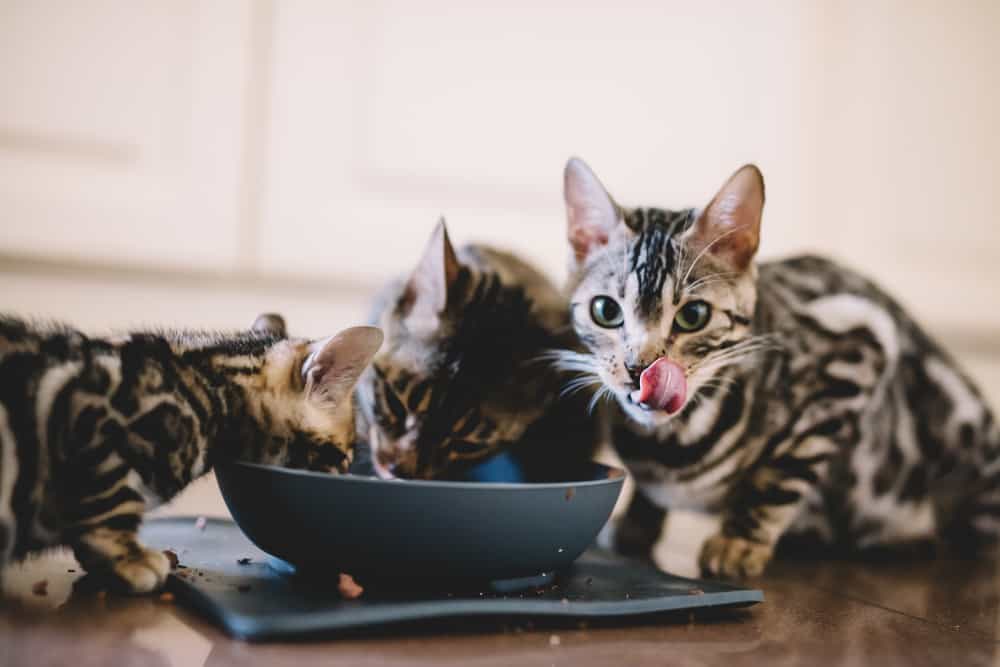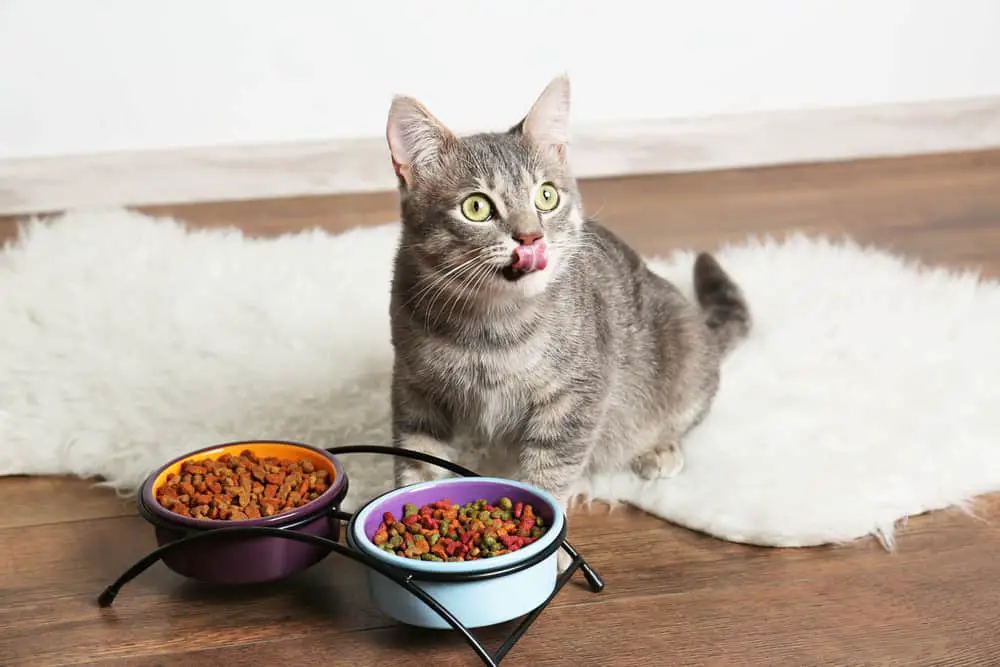Cats love food. It’s a pretty known fact. Even the little sound of a snack pack opening will invite your cats to run from one side of the home to the other to find out what yummy treats might be available to eat.
Even feral/stray cats will run from one side of the field to the other in the quest to obtain food!
So are cats food motivated? Cats are definitely food motivated and it’s down to their very nature as hunters. Cat behaviorists often theorize that because they don’t know when their next meal is, they’re always going to respond and be interested/motivated to eat or obtain food.
This is both a positive and negative thing as 1. It allows them to be more easily influenced in terms of behavior but 2. At the same time, being too food motivated can lead to health issues like obesity, lethargy, or other diet-related illnesses.
Observing your cats and learning how they eat is important for avoiding negative traits and health issues.

Why Are Cats Food Motivated?
Food can make the quietest of cats vocal and yell at the top of their lungs. Again, it really comes down to their inner nature. They are predators.
In the wild, if they waited until they were hungry to hunt and eat, it’s highly probable that they would die of starvation. Their success rate of hunting something successfully and eating it is only about 50%.
In addition, there might not even be prey available at the time when they become hungry!
What Does It Mean To Be Food Motivated?
We all know that cats are pretty aloof. They’re not like dogs where you are able to call them and they’ll do what you tell them to. Sometimes cats will come, depending on how you’ve trained them or what they expect from you. However, if you’re not offering them anything interesting then it’s a pretty sure thing that they’ll ignore whatever it is that you have to say.
There are a couple of things that will get a cat’s attention though. First being prey and the second being food. As discussed above, we know the reasons for this.
Cats are careful and they like to be sure that they will have the energy for the next hunt whenever it comes, so they will usually come whenever there’s something good to eat. Even if they already had their meals, though it will be of a lesser effect.
When Is A Cat Not Food Motivated?
Usually, when you’re free-feeding a cat, they are constantly full. They don’t have time to even feel any pangs of hunger and just continuously expect the food to be there 24/7.
This can cause problems, the most obvious one being overeating but there are other problems that are associated with this as well.
The main problem being energy levels. They are completely unpredictable. At times very lethargic and other times may be active at inappropriate times like at night time.
It’s why I always recommend cat owners to feed their cats on a set schedule with meal times. We can set their routines and habits around meal times and can create a more predictable and enjoyable lifestyle for our cats. As a result, cat butlers can have a more productive life as well! Read more about the importance of scheduled meals here!
Another thing to note is that when a cat doesn’t eat for prolonged periods of time, it’s almost always some sort of stress issue or a medical issue. So it’s always important to observe how your cats are during meal times.
If they eating or not eating, it’s one of the first signs that something could be wrong with your cat!
How Food Motivation Can Affect Cats
Food motivation can have different effects on cats. Some are very positive and some are negative if we are not able to recognize it and make changes.

There’s a very common saying in the cat world that a hungry cat is a malleable cat. Their love for food is why cats are able to be trained, influenced, and socialized.
Every cat has their own preferences of what food or snacks they like. When you find their favorites, take note and give it to them when you think they’re doing something really well. It is very effective in reinforcing the good behaviors or actions that you want.
This is a tool that I use frequently when introducing a new cat in my apartment. Because I give my cats scheduled meals, I know when they are hungry. So when it’s time to eat, everyone tries to eat together with the new kitten or cat.
As they experience that the new cat is harmless and always there during food time, they start to associate each other with positive feelings. In the end, my introductions only last a few days at most.
It’s also, of course, used when training your cat to do something. For example, cat wheel training. I always end a training session with food so that it reinforces this behavior so that they will hopefully independently go on the cat wheel even when I’m not actively training them to do so.
Again, the constant reinforcement of food allows them to associate the wheel or whatever I’m trying to do with good feelings. As a result, they’re more likely to do it in the future.
What To Do When Cats Are Food Obsessed?
Cats are all different of course and there are some exceptions when food motivations become food obsessive. Some owners have talked about their cat being overly vocal (constant meowing), or even destructive to try to get to where the food or snacks are stored. Some cats even exhibited pica (eating non-food items).
If your cat is having these problems, the first obvious place to go is the vet as these might be symptoms of an underlying problem. Once medical issues are ruled out, we can work with the cats more closely to solve these issues.
The second thing I would do is to keep all food items and snacks in cupboards or cabinets above the head. If it’s in a drawer below, cats always somehow get into them and drag out the food.
Once a cat finds out that there might be some food or treats inside, this might create a new habit and they’ll keep trying to get into those spots. So it’s best to just nip it in the bud and keep the food and snacks securely away from them.
The next thing is to keep consistent about is when you react to your cat’s calls/meows. For example, never respond or do anything when your cat is vocal unless it’s almost their mealtime.
If they are given food or attention when they meow or make noise, they have effectively trained you to do something every time they call. My Bengal cat, Latte, was always incredibly vocal about food. He would call constantly for 10 minutes until he finally stopped and realized that his meows wouldn’t spark any reaction.
Now, all my cats know when their mealtimes are and only make noise when that time comes.
Conclusion
In conclusion, food can be a powerful tool to help your cat know what is appropriate or inappropriate. Allow your cats to feel rewarded with food rather than feel bloated all the time because of free-feeding. In combination with play (how to properly play with your cats) and territorial confidence, cats are able to have well-balanced lives!

I am loving all of your posts and these are so helpful! I just had a Bengal kitten and she is 5 months old now. I am wondering what treats are best for bengals to motivate them and be trained. I purchased Temptation crunchy and soft salmon flavor… she doesn’t like it. I want to train her so that in the future I’ll be able to take her outside with me.
Interesting! My Bengal loves temptations! Cats definitely are individuals, so they’ll have their own preferences. Try some softer treats instead. Maybe it’s the texture that’s putting her off! Thanks for your comment.